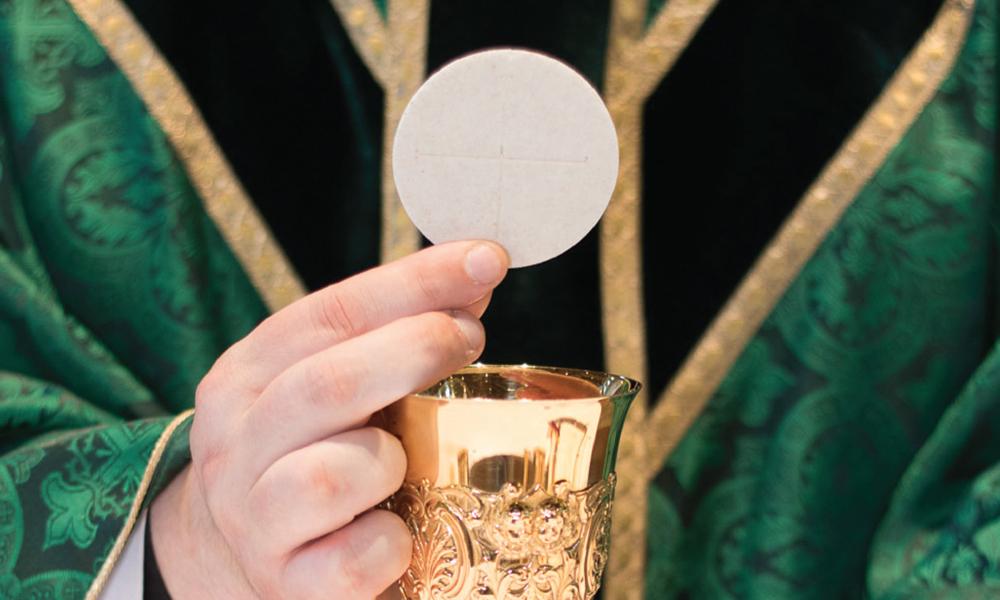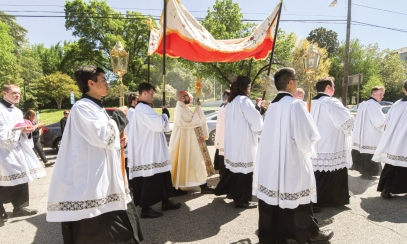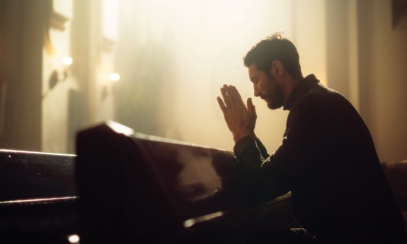
The Eucharist and the Challenge of Apathy
A now infamous Pew study was released in 2019. It said over two thirds (69%) of those who designate themselves as Catholics in the United States do not believe in the Real Presence of Christ in the Eucharist (as described in Church teaching according to the doctrine of transubstantiation). This study was the original inspiration for Bishop Robert Barron, then Secretary of Evangelization and Catechesis for the U.S. Conference of Catholic Bishops, to propose a National Eucharistic Revival. It was his successor in the role, Bishop Andrew Cozzens of the Diocese of Crookston, Minnesota, who brought the process to fruition.
A now infamous Pew study was released in 2019. It said over two thirds (69%) of those who designate themselves as Catholics in the United States do not believe in the Real Presence of Christ in the Eucharist (as described in Church teaching according to the doctrine of transubstantiation). This study was the original inspiration for Bishop Robert Barron, then Secretary of Evangelization and Catechesis for the U.S. Conference of Catholic Bishops, to propose a National Eucharistic Revival. It was his successor in the role, Bishop Andrew Cozzens of the Diocese of Crookston, Minnesota, who brought the process to fruition.
The results of this study are alarming, especially coupled with the large drop in Mass attendance after the COVID-19 crisis. The first reaction many of us had was to question the questioners — were the survey questions sufficiently and clearly worded? Were they prone to leading respondents to certain answers or conclusions? This critique is warranted.
Interestingly, the same study also showed that among those Catholics who attend Mass weekly, the numbers are nearly reversed — 63% say they believe in the Real Presence as articulated in the doctrine of transubstantiation. This shows us that, at least to some extent, active and engaged Catholics consistently look to the Eucharist for nourishment and strength. It is likely that their active engagement is due to faith in the power and effectiveness of the Real Presence.
Science & Ideology
Nonetheless, we still need to ask: what about those who don’t believe in the Real Presence? Where does this doubt come from?
I think our immediate reaction is to blame secularism and what we can call the scientism of our age — that is, to indicate a quasi-religious belief that the methodology of the natural sciences is the only measure of all truth. Those who wittingly or unwittingly submit to this ideology often work with a nebulous notion of science that is a vague, undefined idea. Far from being based on empirical observation, it becomes a view of the natural sciences that submits observation to the human will. It makes facts malleable and subordinates them to ideology. It is not at the heart of the question at hand, but it is a factor. It may play a role when we have trouble reconciling what our senses perceive and what our faith tells us is really there in the Eucharist. We cannot discount it totally as a factor in misshaping views of the Eucharist among the faithful.
Something else is primarily at play in our society. We are not talking about a group of atheists or agnostics in this study — it’s about a group that indicates that they have some kind of faith, even if it is a partial faith. Those featured in the Pew study think of themselves as Catholics.
For years we have talked about the challenge of the religiously unaffiliated, the “nones,” many of whom are former Catholics. According to a 2012 Pew study, 71% of this unaffiliated group does not consider themselves agnostic or atheist. The point is that as Christians called to evangelize, we face a bigger challenge than atheism — or its more honest sibling agnosticism.
Divine & Human Apathy
We face apathy. You see, with the apathetic the good news has often been heard to some extent, maybe even including the good news of the gift of the Eucharist. Not only has it been heard, it has actually been accepted to some degree among the unaffiliated with a remaining sense of religiosity or spirituality.
Another way of thinking about this is in terms of what exactly we mean by belief and faith. Intellectual assent is not the relationship that we describe as faith. A lot of our society resides in a hazy notion of the spiritual or supernatural that includes a sense of God. But this God would seem to possess the same level of apathy as those who hold this notion of the divine — a reciprocal relationship between lived human apathy and perceived divine apathy.
God’s activity in our lives calls forth a response in kind. The mistakes began with the perception of the kind of activity God shows the world.
In the 17th and 18th centuries, the worldview from the deists of the Enlightenment was to believe in a “clockmaker God.” The divine set the world in motion in an orderly way but did not intervene. Their view centered on the divine intellect and presumed that the divine was apathetic because emotion and reason are strangers.
The error we see in the view of God today is the perception of divine aloofness. It holds a counterpart of false humility, one that presumes the God of all Creation does not care about individual and particular creatures.
Challenges & Barriers
What does this have to do with the Eucharist? I think the biggest challenge to faith in the Eucharist today has more to do with apathy than atheism. The barrier for many people in today’s society is not the possibility of the Real Presence. After all, if God is God, then anything is possible.
Rather, the barrier is in thinking about the actuality of the Real Presence, the fact that Christ actually does become present to us. Our society’s view is not that Real Presence cannot happen, but that it does not happen. To flip that around conceptually, the roadblock to eucharistic faith for many is not that Christ can make himself present to us in this form, but that he actually does and does so all the time. We have trouble accepting the intimacy and love that our Lord so readily offers and communicates in his self-gift of the Eucharist.
Apathy and the projection of apathy onto God leaves us empty and hungry for a relationship of real love and true meaning. At its root, apathy is a symptom of the belief in meaninglessness. If there is no purpose or significance, then nothing matters. Once the highest thing is removed from our perception of reality, everything else becomes distorted and broken. It leaves us feeling underwhelmed and disillusioned. Apathy and aimlessness are the malaise of our society.
The Good News of the Gospel is that we don’t have to be imprisoned by meaninglessness.
One of the biggest dangers is for us to think that we are just talking about some other group of people: a them distinct from us. Reality is more complicated. This is the society in which we are immersed, and it shapes us. Even for the most faithful, a sense of apathy — or worse of divine apathy — can be a hazard to our relationship with God. We need reminders of God’s superabundant, ever-merciful and present love. That we find ourselves within this culture means we’re equipped to evangelize it. After all, we understand the challenges and more importantly, we have encountered the answer.
Response & Presence
The Eucharist gets us right to the heart of the Good News. It is a sign that our God is not apathetic. Rather, the Incarnation and Paschal Mystery, which the Eucharist presents to us, indicate that our God is the kind of God who gets involved. He is not aloof. Our God is always present to us in many ways, but in a special way in the Eucharist. Viewing God in this light, that is, the light of the Gospel, is truly countercultural.
It also provides the best possible response to the deep longing that the apathy of our culture, which bleeds into every relationship, leaves us. Talking about the Eucharist provides an opportunity to propose to a world, one weary of its own aimlessness, the possibility of a God of genuine love, a God around whom one’s life can be shaped, formed and given meaning. This is not a God removed from his creation, but one that loves all he has created.
Only through an intimate encounter with the loving God can we leave our apathy, and the notion of an apathetic God, behind us; he is the counter to apathy. The Eucharist is our pathway to love.
Michael Martocchio, Ph.D., is the secretary of evangelization and the director of the Office of Catechesis and Christian Initiation. Email him at mmartocchio@charlestondiocese.org.



